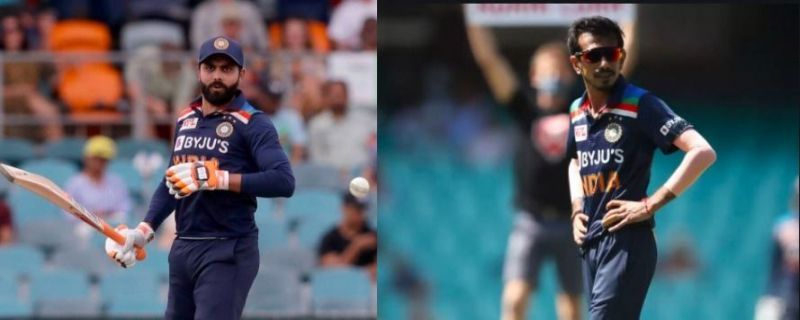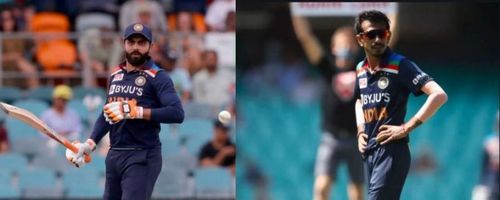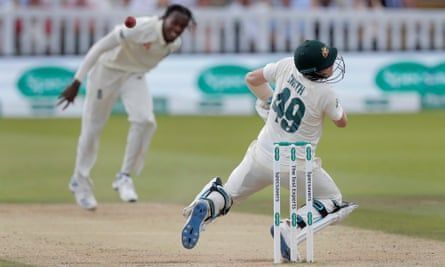
IND v AUS 2020: Why the Indian team did not misuse the Concussion Substitute Rule

The concussion replacement by India during the first T20I against Australia at Manuka Oval, Canberra on Friday has sparked debates about the concussion substitute rule and its potential misuse.
Ravindra Jadeja was hit on the helmet by a Mitchell Starc bouncer during the final over of the Indian batting innings. However, he continued to bat for the rest of the over.
After the innings break, the announcement came that Jadeja was diagnosed with a concussion and Yuzvendra Chahal would replace him.
The controversy was majorly on two fronts.
- Some experts raised the point that the Indian physio did not come on the field as soon as Jadeja was hit on the helmet, which they pointed out as a breach of protocol.
- Jadeja was limping earlier in the innings due to a potential hamstring injury. Hence, opinions floated about India unfairly using the concussion substitute rule to replace an unfit Jadeja.
Let's examine the ICC’s laws about the concussion replacement protocol, and check if the Indian team took undue advantage with the substitution.
Why the Indian team did not misuse the Concussion Substitute Rule
In July 2019, the International Cricket Council (ICC) allowed the use of concussion replacements in international matches, with the substitute having to be a "like-for-like replacement" for the player replaced.
Under the rule, a replacement can be allowed if a player sustains an injury to the head or neck during the course of play and within the playing area.
With this background, let us check the validity of the two questions raised earlier.
Why is the Indian physio not immediately attending to Ravindra Jadeja not a breach of protocol?
The concussion management protocol of ICC specifies that a team doctor/physio run out for an on-field assessment:
- If called on by the umpire;
- If a player is down and players are calling for assistance;
- Immediately, if there is a head knock and the player is unable to resume after 3 to 4 seconds;
- If a player calls for a new helmet following a head injury; and
- At the end of the over, if the player resumes play after having sustained a blow to the head.
According to the ICC’s concussion management protocols, a physio should immediately run onto the field and attend to a player hit on the head only if the player is down, or if the players or the umpire calls him out onto the field, or if the player asks for a new helmet.
In the absence of the aforementioned circumstances, if the player resumes playing immediately after getting hit, the physio can tend to the player at the end of the ongoing over.
In the situation under question, Ravindra Jadeja was hit on the helmet off Mitchell Starc’s delivery during the final over of the innings. He resumed play right away and hence there was no requirement for the physio to come out immediately.
Ravindra Jadeja’s case could have been of a delayed concussion, which the physio might have identified after examining him in the dressing room. Questioning the opinion of a medical expert in this regard doesn't sound valid.
It does not always happen that concussion shows immediate signs. It may be delayed, even for several hours in certain cases. When Steve Smith was hit by the bouncer of Jofra Archer in the Ashes Test of 2019, he continued to bat and the symptoms only appeared on the next day after which he was substituted.

Also read: 'Ravindra Jadeja was feeling dizzy when he came into the dressing room'
Why Yuzvendra Chahal replacing Ravindra Jadeja was not a case of excessive advantage?
The Concussion Replacement rules in the ICC’s Playing Conditions specify the following:-
1.2.8.1 In assessing whether the nominated Concussion Replacement should be considered a like-for-like player, the ICC Match Referee should consider the likely role the concussed player would have played during the remainder of the match, and the normal role that would be performed by the nominated Concussion Replacement.
1.2.8.2 If the ICC Match Referee believes that the inclusion of the nominated Concussion Replacement, when performing their normal role, would excessively advantage their team, the Match Referee may impose such conditions upon the identity and involvement of the Concussion Replacement as he/she sees fit, in line with the overriding objective of facilitating a like-for-like replacement for the concussed player.
The ICC’s Playing Conditions specify that the substitution in case of a concussion injury must be a like-for-like one. It further elaborates that the substitute should be allowed to do only those normal roles which the substituted player would have performed in the remainder of the match.
In the current situation, Ravindra Jadeja was substituted by Yuzvendra Chahal after India’s batting innings. Ravindra Jadeja is a regular bowler in the line-up and would have bowled four overs in the second innings as a part of his normal role. The substitute, in this case, Yuzvendra Chahal, fulfilled the same role that Jadeja would have done.
Alternatively, if a pure batsman like Virat Kohli had suffered a concussion and was substituted by a bowler like Yuzvendra Chahal or an all-rounder like Hardik Pandya, they would not have been allowed to bowl at all since Virat Kohli would not have bowled in the normal course of play.
Check out: 'This concussion sub rule will generate a lot of discussion
Concussion must be formally diagnosed by the Team Medical Representative
The ICC Playing Conditions specify that:
1.2.7.2 a concussion or suspected concussion must have been formally diagnosed by the Team Medical Representative;
1.2.7.3 the Team Medical Representative or Team Manager shall submit a Concussion Replacement Request to the ICC Match Referee on a standard form.
1.2.9 The decision of the ICC Match Referee in relation to any Concussion Replacement Request shall be final and neither team shall have any right of appeal.
The Team Medical Representative has the power to formally diagnose the concussion after which they should submit a report to the Match Referee. The ICC Match Referee can request further information to be completely satisfied.
Once the Concussion Replacement Request is approved by the Match Referee, neither team have any right of appeal according to the ICC’s Playing Conditions.
It must be construed that the Concussion Replacement Request submitted by the Indian team was approved by the ICC Match Referee David Boon, based on the report of the Medical Representative and after ensuring that there is no added advantage to the side.
One may argue that Jadeja was suffering from a hamstring injury which did not warrant a substitution but the decision was made by the specified authority, the ICC Match Referee on this occasion.